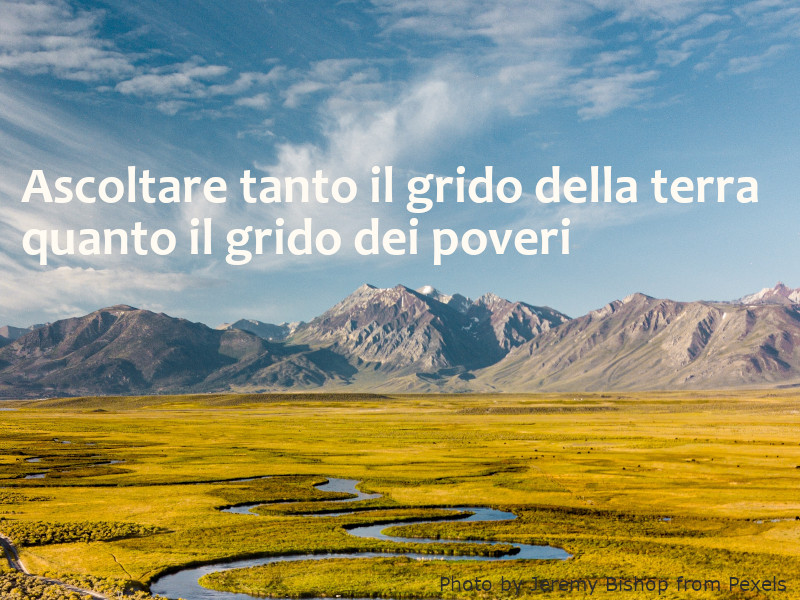Grande piano pluriennale voluto da papa Francesco, da realizzare con la regia del Dicastero per il servizio allo sviluppo umano integrale, coordinato dal Movimento Cattolico Globale per il Clima, con USG-UISG come partner strategico per l’ambito degli istituti religiosi.
Over the past few months we have brainstormed ideas about the engagement of Religious Congregations into the Laudato Si’ Action Plan. We started with what the GCCM and the DPIHD were already elaborating and we tried to design a proposal that would:
= integrate what Religious communities are already doing
= be simple and gradual enough to be manageable
= be inspiring enough to motivate
= and flexible enough to suit different contexts.
As time elapsed, we realized that:
= the work of GCCM is geared at setting up a Laudato Si’ Platform to facilitate access to resources, exchange of experiences and connection among participants. The Platform will be based on three conceptual steps, namely: Learn, Act, Track. The idea is to promote informed response and to measure progress towards sustainability;
= the road-map developed by the Dicastery is more focused on integral ecology, setting for this purpose 7 goals that will guide the ecological conversion and action. The concern for spirituality is paramount and, as for measuring progress, the so called «metrics» are not to come from top-down. It is the task of participants to define their own metrics, based on the principle of local planning and protagonism. However, there is a suggestion to invite participants to set precise yearly targets of change.
At this point, we need to make a synthesis, in the format of a proposal that may be appealing to the Religious.
A Friendly Approach
We are aware that often Religious communities are overstretched with commitments and they are not likely to manage adding new stuff to an already full agenda. A friendly approach would be offering them the opportunity to re-qualify their life-style / witness and ministry, building on what they are already doing and living.
Most importantly, the proposal needs to be clear and simple, so as to avoid discouraging participation and active involvement, which could also grow gradually, at the pace of each community.
We would like to link up with already existing initiatives, in order to create synergies and communion, and to avoid duplication of programs.
A simple three-step process
I am wondering whether we could propose something that looks, at least at first sight, simple and not too much articulated (as far as possible, of course). For instance, a process like:
1. TAKE THE PLEDGE FOR INTEGRAL ECOLOGY
The pledge of GCCM is too narrow, in that it looks at the climate change rather than integral ecology. Moreover, even in the LS Action Platform this element seems to be overtaken by developments. I am not sure whether in the context of all the current processes it remains a key advocacy strategy, or whether it needs to be relaunched with a broader scope (i.e. integral ecology) in the context of the proposal from the Dicastery.
I find that taking a pledge is still important, because it requires discernment, decision and public commitment. The Pledge campaign could be refocused in terms of integral ecology.
Above all, this step is to be characterized by a strong emphasis on spirituality, which constitutes the basis for meaning, motivation, and commitment.
2. ECOLOGICAL CONVERSION
The essence of this step is about integrating the 7 goals of integral ecology in community planning and evaluation. For this purpose, we could offer practical tools that Religious Communities would be encouraged to adopt. Each tool would promote growth toward the attainment of some of the 7 goals. For example:
= Social Inclusion Toolkit: responding to the Cry of the Poor, Community Engagement, Eco-economy
= Carbon Footprint Reduction Toolkit: responding to the Cry of the Earth, Simple Lifestyles, Eco-economy
= Reduce, Reuse, Recycle Toolkit: responding to the Cry of the Earth, Simple Lifestyles, Eco-economy
= Mainstreaming Integral Ecology Toolkit: Eco-spirituality, Eco-education
= Joining global campaigns: Community Engagement, Eco-economy
The tools would be designed according to the See – Judge – Act (or Pastoral Cycle) methodology and would help Religious communities to:
= assess their situation and territory,
= discern what contribution to integral ecology the Spirit calls them to make,
= integrate their response in their annual planning and
= make an end of the year evaluation and new assessment, to start another cycle of change
3. JOURNEYING TOGETHER
= The proposed tools for ecological conversion could have links to the LS Action Platform, so as to facilitate synergy and synodality.
= Likewise, at this level we could encourage communities to join the Constellations
= Issues of “certification” could also be taken care of at this level, even though – personally – I wouldn’t give much emphasis to such issue.
= Networking, relationships – building bridges, bringing people together
Movimento cattolico mondiale per il clima
Dicastero per il servizio dell sviluppo umana integrale



